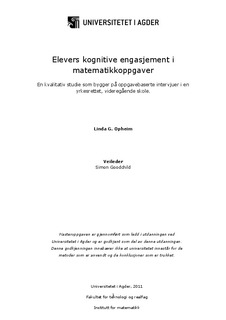| dc.description.abstract | The theme of this master‟s thesis is cognitive demands in mathematical tasks. There has been done a lot of research within the field, and Stein and her colleagues (2000) have developed a theoretical framework to help analyze and implement mathematical tasks according to their cognitive demand. This framework is called the Mathematical Tasks Framework (MTF) and it describes four different levels of cognitive demand. The quality of mathematical tasks has been an area of interest for me for a long time, and I decided that I wanted to follow up the work of Stein and her colleagues (2000), but I wanted to pay more attention to the cognitive level at which the pupils were actually engaging when working on tasks. Therefore my research question is: What cognitive demands can I identify in the interaction between pupil and mathematical tasks?
I present in the theory section reasons for choosing a focus on analyzing and designing mathematical tasks. This is followed by a short historical overview of learning goals in the different Norwegian syllabuses, which I believe influences the choice of tasks the pupils experience in the classroom. I then present MTF, which is my theoretical framework. Finally, I have a section about text tasks relating to the Framework.
I collected data from two classes in a vocational secondary school. I observed the classes for a week, and I used the information gained to design mathematical tasks, appropriate to the pupils‟ current experience, according to the four levels of cognitive demands described by the MTF. I then conducted task-based interviews with nine of the pupils. In addition, I carried out interviews with the teacher and wrote field notes. I used the characteristics of the levels of cognitive demand to code the data from the task-based interviews, and I found that for the most time the results were in accordance with what other researchers in the field have concluded. Still, I have one example where the identified cognitive level at which the pupil is engaging, is higher than what pre-analysis suggested. This is not in accordance with for instance the work of Henningsen and Stein (1997), who claim that the level of cognitive demand is hardly ever increased during implementation. I believe this might be a result of methods used, because I have observed the same result in a previous work with pupils.
My study also shows that the levels of cognitive demand at which pupils engage is dynamic. Within one solution process, pupils might vary the cognitive level at which they are engaging. Another issue is that there are cognitive challenges the MTF does not consider. I show that this is the case with certain text-based tasks, and also I show that a pupil using guessing as a strategy might affect the cognitive demand of the task. The process of analyzing my material revealed features of pupils‟ engagement not covered by the MTF but which had some influence on the cognitive levels at which the pupils engaged. Further reading led to a theory on deep- and surface approaches and self-theories, which appear to offer explanations. These theories were used to re-analyze two of the interviews as case-studies. This new analysis revealed how the pupils‟ approaches and attributions might affect their cognitive engagement on mathematical tasks.
Henningsen, M., & Stein, M. K. (1997). Mathematical tasks and student cognition: Classroom-based factors that support and inhibit high-level mathematical thinking and reasoning. Journal for Research in Mathematics Education, 28(5), 524-549.
Stein, M. K., Smith, M. S., Henningsen, M. A., & Silver, E. A. (2000). Implementing standards-based mathematics instruction: A casebook for professional development: Teachers College Press National Council of Teachers of Mathematics. | en_US |
